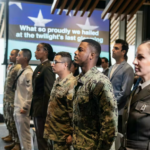| By Valeria Fernandez
New America Media Apr 13, 2011 PHOENIX, Ariz.—The U.S. Ninth Circuit Court of Appeals on Monday upheld a federal judge’s decision to temporarily suspend key parts of Arizona’s SB1070, the law that making it a state crime to be an undocumented immigrant. The ruling is being celebrated by pro-immigration groups, but it offers little relief to immigrants. “Everything remains the same,” said Raúl Cordero, an immigrant from Mexico and member of a Neighborhood Defense Committee in Phoenix. “There are still police officers out there that are implementing this law at their discretion,” he added. Gov. Jan Brewer, a Republican, signed SB 1070 into law on April 23, 2010. The U.S. Department of Justice subsequently filed a lawsuit arguing that SB 1070 was pre-empted by federal law. And on July 28 of last year, four provisions of the legislation were prohibited from taking effect by Federal Judge Susan Bolton. Gov. Brewer appealed Bolton’s decision, only to lose by two-to-one in the Ninth Circuit Court. One of the law’s suspended provisions, now upheld on appeal, would require police officers to determine the immigration status of a person they come into contact with based solely on the officer’s suspicion that the person is in the United States illegally. Another provision would make it a crime for people not to carry immigration documents to prove their legal status. The other suspended provisions would allow police to arrest a person they suspect of being in the country illegally, and would criminalize undocumented immigrants who apply for a job or are employed. “The question before us is not, as Arizona has portrayed, whether state and local law enforcement officials can apply the statute in a constitutional way,” says the appeals court decision ruling. “There can be no constitutional application of a statute that, on its face, conflicts with congressional intent and therefore is preempted by the Supremacy Clause.” That is, the court found that Arizona lawmakers couldn’t reinterpret federal laws beyond what Congress intended. Lydia Guzmán, president of Respect/Respeto, an organization that documents human and civil rights violations, described the decision as “a victory in court, but not a victory on the streets.” “Police officers are still stopping people and taking them to immigration, and they are still being deported,” she said. Cordero, a member of the PUENTE Movement, an organization that has funded over 30 neighborhood organizing groups in Phoenix, receives daily phone calls from family members of people who were pulled over for no reason or for minor traffic infractions. “Since this law was signed, it was like they stabbed the immigrant community with a 10-inch knife,” said Cordero. The Bolton ruling pulled the knife out five inches, but we are still wounded.” The Ninth Circuit Court’s decision, however, goes “beyond the arguments made by the Department of Justice,” said Dan Pochoda, the legal director of the American Civil Liberties Union (ACLU) in Arizona, one of the parties with pending litigation against SB 1070. Pochoda explained, “(The appeals court) stated strongly that there’s no inherent authority for local law enforcement to enforce a federal, civil immigration law.” Reactionary anti-immigrant groups, he said, have argued that the state didn’t need SB 1070 to detain and deport undocumented immigrants. Gov. Brewer said she is considering appealing Tuesday’s decision to the U.S. Supreme Court or asking for full review of the decision by the three-panel judge by the full Ninth Circuit Court. Most rulings are rendered by three-judge panels, but in some cases contested decisions are adjudicated by all 29 judges on the Ninth Circuit. “I remain steadfast in my belief that Arizona and other states have a sovereign right and obligation to protect their citizens and enforce immigration law in accordance with federal statutes,” said Brewer, in an official statement. “Monday’s decision by the Ninth Circuit Court of Appeals to uphold Judge Bolton’s suspension of key provisions of SB 1070 does harm to the safety and well-being of Arizonans who suffer the negative effects of illegal immigration.” SB 1070 has prompted lawmakers in Georgia, Florida and Alabama to consider enacting similar legislation. “The decision should serve as a warning sign to other states that are considering whether or not to replicate Arizona’s SB 1070,” said Chris Newman, legal counsel for the National Day Laborer Organizing Network. Luis Avila, president of the pro-immigrant Coalition Somos America, warned that SB 1070 does not represent the beginning and end of anti-immigrant law. Despite the recent defeat of five anti-immigrant laws in the State Senate, dozens of others are still under consideration in Arizona. “There are huge implications for the passage of SB 1070. Hundreds of millions of dollars have been lost in the state due to passage of this law,” Avila said. Some studies estimate Arizona has lost close to $140 million in revenues connected to industries that thrive from tourism and state conventions, because of the impact of an SB 1070-inspired economic boycott of Arizona. Avila said that the appeals court ruling is “a sign that our judicial system is defending the constitutionality of laws,” but that it doesn’t offer relief for those already affected. In addition to the local and domestic organizations officially opposed to SB 1070, a number of foreign governments filed opinions with the court to express their disapproval of SB 1070. Among them are the governments of México, Argentina, Bolivia, Brazil, Chile, Costa Rica, Ecuador, El Salvador, Nicaragua, Paraguay and Peru.
|
||
|











